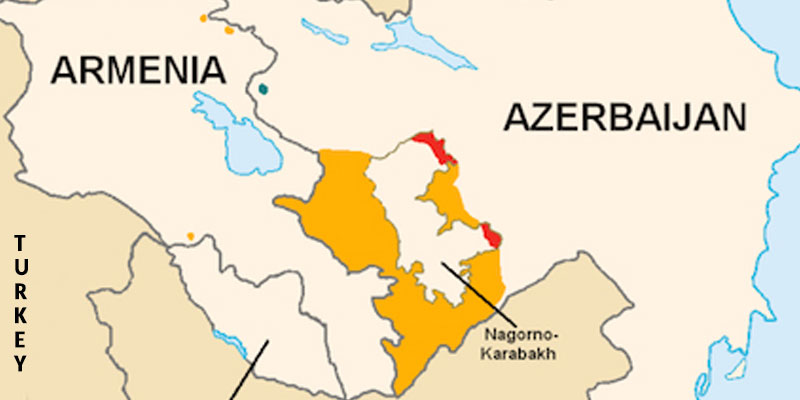- World
- Oct 05
- Mathew Gregory
Nagorno-Karabakh conflict
• The Nagorno-Karabakh conflict is an ethnic and territorial conflict between Armenia and Azerbaijan.
• The dispute is over the region of Nagorno-Karabakh and seven surrounding districts, which are de facto controlled by the self-declared Republic of Artsakh, but are internationally recognized as de jure part of Azerbaijan.
• Under the Soviet Union, Joseph Stalin decided to make the Nagorno-Karabakh region an autonomous oblast of Soviet Azerbaijan.
• The present conflict began in 1988, when the Karabakh Armenians demanded that Karabakh be transferred from Soviet Azerbaijan to Soviet Armenia. The conflict escalated into a full-scale war in the early 1990s.
• Nagorno-Karabakh is a mountainous region of about 4,400 sq km (1,700 sq miles) traditionally inhabited by Christian Armenians and Muslim Turks.
• During the 1988-94 war, an estimated one million people became refugees and about 30,000 killed.
• Since 1994, a stalemate prevailed until now.
• Nagorno-Karabakh is officially part of Azerbaijan but governed by separatist ethnic Armenians. Years of negotiations have never resulted in a peace treaty.
• Hostilities re-ignited following a series of cross-border attacks that occurred over the summer in 2020, killing an Azerbaijani General and some 22 people.
• Nagorno-Karabakh's authorities have confirmed that 201 of their service personnel and a number of civilians have died since the fighting erupted on 27th September.
• International concerns are pouring in with a lot of stakeholders in the conflict. Russia has promised to defend Armenia, Turkey has pledged to support Azerbaijan, and Iran has large Azeri minority.
• Azerbaijan has demanded the withdrawal of Armenian troops from Nagorno-Karabakh and adjacent areas seized by ethnic Armenian troops.
• Meanwhile Armenia has suggested that it is "ready to engage" with mediators from France, Russia and the US to try to agree a ceasefire.
India's Stand
• India has called for restrain and immediate ceasefire.
• Recently, India secured a $40 million defense deal with Armenia for supplying four SWATHI weapon locating radars for which Poland and Russia were also vying for.
• After USSR disintegration in 1991, India recognized the Republic of Armenia and since then there have been multiple head of state visits between the countries.
• However, by supporting Armenia, India will be indirectly endorsing the right to self-determination which is detrimental to India's interest when there is secessionist demand within the borders such as Jammu & Kashmir.
• India & Azerbaijan also go long way in having friendly relations and bilateral cooperation before the Soviet disintegration.
• Azerbaijan supported Pakistan on the Kashmir issue much to the concern of India but India is still resisting itself in taking sides into the current conflict between Azerbaijan & Armenia.
(The author is a trainer for Civil Services aspirants. The views expressed here are personal.)

